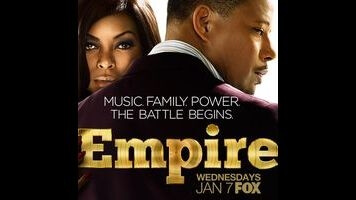Empire is a classic story with a contemporary beat

There’s something soapy and delicious about Empire, the newest collaboration between The Butler duo Lee Daniels and Danny Strong. But it’s a double-edged sword: Empire will either continue to be fun and splashy, while staying grounded and engaging, or it will flame out as so many primetime sudsers have before it, becoming too ridiculous for its own good. Most of Daniels’ catalog works much in the same way: His directorial debut film, Shadowboxer, about a hit man and his partner/stepmother/lover, is unwatchably bad because it goes so far over the top that it’s not fun anymore. Precious teetered on the edge as soon as it escaped into the title character’s dream world, but the film also pushed through those candy-colored fantasies for a view of a life not normally seen on film. And while the hip-hop mogul character is certainly visible within popular culture, there are lives and circumstances highlighted by Empire that are not often seen elsewhere.
Empire is a classic story, jazzed up with a Timbaland beat. “What is this? We King Lear now?” one of the sons of Lucious Lyon (Terrence Howard) asks when called to a family meeting. Lyon, a former Philly drug slinger and current Jay Z-esque mogul, started from the bottom and now he’s blowing off Barack Obama’s state dinner invites. On the verge of going public with his company, Empire Entertainment, Lyon is diagnosed with a debilitating medical condition. So he looks to his scions for a potential successor, and has a range of people to choose from: business-minded Andre (Trai Byers), the talented, gay Jamal (Jussie Smollett), and blustery MC Hakeem (Bryshere Gray, a.k.a. Philadelphia-based rapper Yazz The Greatest).
But Cookie (Taraji P. Henson) complicates things. The mother of the three potential heirs, Cookie previously took the fall for Lucious so he could start Empire, and her release from prison makes his personal and professional life that much more difficult. It’s also where Empire gets interesting: Henson plays Cookie with a sense of overblown camp, but she imbues her with a “don’t fuck with me” ferocity that makes the character feel like less of a caricature and more like a woman who sacrificed 17 years of her life for her family. She counteracts Howard’s inherent inner calm; every time Henson is on-screen, it’s difficult to pay attention to anyone else. If Empire is The Lion In Winter with Lucious as Henry II, then Cookie is a more-than-worthy Eleanor Of Aquitaine. She becomes Jamal’s default protector, nurturing her son’s career as a defiant act against Lucious, who believes Jamal’s sexuality is the one thing standing between his John Legend-esque stylings and stardom.
There are still some kinks that detract from Empire’s soapy loveliness, namely the music. The Timbaland-curated songs sound like Timbaland songs—i.e., plausible hits—but the way the songs are used doesn’t always work. Sometimes they land, like the opening scene where Lucious instructs a young singer on how to infuse her song with emotion. That works because it’s a natural set piece. But the next musical number, a collaboration between Hakeem and Jamal, has a put-on Smash feeling to it. For a show that’s supposed to have a little grit under its fingernails, the spontaneous bursts of musical genius feel even more out of place. As does the score, comprising the swelling strings expected in a primetime drama. But that score is a near constant presence and feels retro when compared to the contemporary music that drives the show.
Aspects like that omnipresent orchestral swell point to a direction where the suds start to overflow and Empire becomes a mess of soapy ridiculousness, rather than the controlled fun it is now. But the pilot, at least, leans on the tropes of inheritance stories that have come before, keeping the grandiose proclivities of its creator in check.